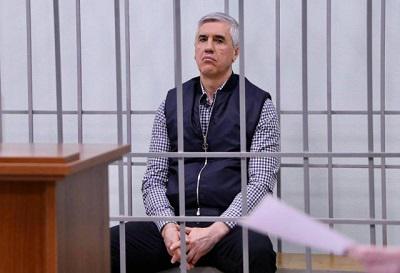The Kirovsky District Court of Krasnoyarsk sentenced the businessman Anatoly Bykova to 12 years in prison in the third criminal case of murder, the press service of the courts of the Krasnoyarsk Territory reported in telegram channel.
Bykov was found guilty of inciting the murder of crime boss Vladimir Filippov and his organization (Part 2 of Article 105 of the Criminal Code). He was sentenced to 12 years in prison, but taking into account the previously imposed punishment, he will spend a total of 20 years in a maximum security colony.
The court report notes that the businessman did not admit guilt. The verdict has not yet entered into legal force.
According to investigators, in 1998, Bykov, being the head of the criminal community he created, instructed his subordinates to kill the criminal authority Vladimir Filippov. The businessman’s accomplices followed the victim and shot him on the night of June 17-18, 1998.
Kommersant.Ru, 02.11.2023, “Anatoly Bykov’s sentence is being extended”: As indicated in the investigation materials, in 1998, Anatoly Bykov instructed the chief of the killer brigade, who was under his command, to Vilora Struganov (Pasha Tsvetomusika) eliminate the criminal authority Vladimir Filippov (Philip).
Law enforcement officers believe that the businessman needed the reprisal against Philip to “strengthen his influence in the criminal world.” The case notes that Vilor Struganov and killers Alexander Zhivitsa (Bul) and Igor Elovsky (Yolka) tracked the victim for several days. On the night of June 18, 1998, at the entrance of multi-story building No. 187 on Alyosha Timoshenkov Street, the perpetrators fired six bullets from two pistols at the “authority,” leaving him no chance to survive.
According to sources familiar with the course of the trial, among other evidence of Anatoly Bykov’s guilt, the prosecutor cited the testimony of other defendants in the case – Vilor Struganov, Alexander Zhivitsa and Igor Elovsky, who were initially sentenced to impressive terms of imprisonment for this and other serious crimes, but then they were commuted punishment. — Insert K.ru
This is the third criminal case of murder brought against Bykov. The entrepreneur was detained in May 2020, at the same time he was arrested and placed in a pre-trial detention center. In 2021, the court handed down his first sentence for organizing murders, then a businessman received 13 years in prison. According to investigators, in 1994, a conflict arose between the entrepreneur and one of the members of the criminal group he led, Alexander Naumov, over the distribution of income, which the latter considered unfair. Later, someone blew up Bykov’s car, he blamed it on Naumov and decided to kill him and the victim’s close friend Kirill Voitenko. Both were soon shot dead; Bykov did not admit guilt.
In May 2023, a court in Krasnoyarsk sentenced Bykov to another 11 years of strict regime for inciting the murder of the founder of a Krasnoyarsk industrial waste disposal company Andrey Nekolov. The latter, according to investigators, refused to do business with Bykov and was killed. The court also considered the issue of sentencing Bykov for inciting the attempted murder of the vice-president of the regional boxing federation Andrey Grabovsky, however, the defendant was released from liability due to the expiration of the statute of limitations. The prosecution believed that the reason was Grabovsky’s move to Bykov’s competitor, a crime boss nicknamed Diplomat. Subsequently, the entrepreneur managed to escape.
In total, based on the sum of the two sentences, Bykov had to spend 17 years in prison. The businessman did not admit guilt.
Bykov worked as a physical education teacher until the 1990s, then founded the Construction, Technology, Metal (STM) company, and in 1992 acquired a 10% stake in the Krasnoyarsk Aluminum Smelter (KrAZ), the second largest aluminum smelter in the world. A few years later, he headed the board of directors of the company, and his share increased to 28%.
In 1996, he was elected to the Nazarovo City Council, and a year later to the Legislative Assembly of the Krasnoyarsk Territory, then he was successfully re-elected several times. Bykov considers the criminal prosecution to be politically motivated: in his opinion, it was initiated to prevent him from being elected to the State Duma.









